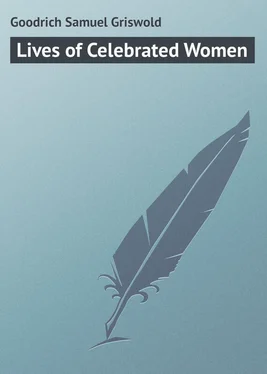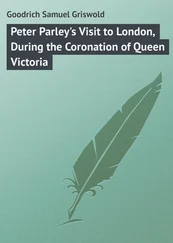Samuel Goodrich - Lives of Celebrated Women
Здесь есть возможность читать онлайн «Samuel Goodrich - Lives of Celebrated Women» — ознакомительный отрывок электронной книги совершенно бесплатно, а после прочтения отрывка купить полную версию. В некоторых случаях можно слушать аудио, скачать через торрент в формате fb2 и присутствует краткое содержание. Жанр: foreign_prose, на английском языке. Описание произведения, (предисловие) а так же отзывы посетителей доступны на портале библиотеки ЛибКат.
- Название:Lives of Celebrated Women
- Автор:
- Жанр:
- Год:неизвестен
- ISBN:нет данных
- Рейтинг книги:5 / 5. Голосов: 1
-
Избранное:Добавить в избранное
- Отзывы:
-
Ваша оценка:
- 100
- 1
- 2
- 3
- 4
- 5
Lives of Celebrated Women: краткое содержание, описание и аннотация
Предлагаем к чтению аннотацию, описание, краткое содержание или предисловие (зависит от того, что написал сам автор книги «Lives of Celebrated Women»). Если вы не нашли необходимую информацию о книге — напишите в комментариях, мы постараемся отыскать её.
Lives of Celebrated Women — читать онлайн ознакомительный отрывок
Ниже представлен текст книги, разбитый по страницам. Система сохранения места последней прочитанной страницы, позволяет с удобством читать онлайн бесплатно книгу «Lives of Celebrated Women», без необходимости каждый раз заново искать на чём Вы остановились. Поставьте закладку, и сможете в любой момент перейти на страницу, на которой закончили чтение.
Интервал:
Закладка:
To glide along on memory’s stream,
And bring back thrilling thoughts of thee;
Ere I knew aught but childhood’s dream,
Thy soul had struggled, and was free.
I cannot weep that thou art fled;
Forever blends my soul with thine;
Each thought, by purer impulse led,
Is soaring on to realms divine.
I hear thee in the summer breeze,
See thee in all that’s pure or fair,
Thy whisper in the murmuring trees,
Thy breath, thy spirit, every where.
Thine eyes, which watch when mortals sleep,
Cast o’er my dreams a radiant hue;
Thy tears, “such tears as angels weep,”
Fall nightly with the glistening dew.
Thy fingers wake my youthful lyre,
And teach its softer strains to flow;
Thy spirit checks each vain desire,
And gilds the lowering brow of woe.
Thou gem of light! my leading star!
What thou hast been I strive to be;
When from the path I wander far,
O, turn thy guiding beam on me.
Teach me to fill thy place below,
That I may dwell with thee above;
To soothe, like thee, a mother’s woe,
And prove, like thine, a sister’s love.
When all is still, and fancy’s realm
Is opening to the eager view,
Mine eye full oft, in search of thee,
Roams o’er that vast expanse of blue.
I know that here thy harp is mute,
And quenched the bright, poetic fire;
Yet still I bend my ear, to catch
The hymnings of thy seraph lyre.
O, if this partial converse now
So joyous to my heart can be,
How must the streams of rapture flow,
When both are chainless, both are free! —
When, borne from earth for evermore,
Our souls in sacred joy unite,
At God’s almighty throne adore,
And bathe in beams of endless light!”
Although the extracts from the works of this gifted being have been so extensive, we cannot forbear giving some portions of a piece written about the same period, and entitled —
“Launched forth on life’s uncertain path,
Its best and brightest gift denied,
No power to pluck its fragrant flowers,
Or turn its poisonous thorns aside; —
No ray to pierce the gloom within,
And chase the darkness with its light;
No radiant morning dawn to win
His spirit from the shades of night; —
Nature, whose smile, so pure and fair,
Casts a bright glow on life’s dark stream, —
Nature, sweet soother of our care,
Has not a single smile for him.
When pale disease, with blighting hand,
Crushes each budding hope awhile,
Our eyes can rest in sweet delight
On love’s fond gaze, or friendship’s smile.
Not so with him ; his soul chained down
By doubt, and loneliness, and care,
Feels but misfortune’s chilling frown,
And broods in darkness and despair.
Favored by Heaven, O, haste thee on;
Thy blest Redeemer points the way;
Haste o’er the spirit’s gloom to pour
The light of intellectual day.
Thou canst not raise their drooping lids,
And wake them to the noonday sun;
Thou canst not ope, what God hath closed,
Or cancel aught his hands have done.
But, O, there is a world within,
More bright, more beautiful than ours;
A world which, nursed by culturing hands,
Will blush with fairest, sweetest flowers.
And thou canst make that desert mind
Bloom sweetly as the blushing rose;
Thou canst illume that rayless void
Till darkness like the day-gleam glows.
Thus shalt thou shed a purer ray
O’er each beclouded mind within,
Than pours the glorious orb of day
On this dark world of care and sin.
And when the last dread day has come,
Which seals thine endless doom, —
When the freed soul shall seek its home,
And triumph o’er the tomb, —
When lowly bends each reverend knee,
And bows each heart in prayer, —
A band of spirits, saved by thee,
Shall plead thy virtues there.”
Hitherto Margaret had sedulously avoided all conversations about her health, and seemed unwilling to let the feeling that disease had marked her for its victim take possession of her mind. But in the summer of 1838, she one day surprised her mother by asking her to tell her, without reserve, her opinion of her state. “I was,” says her mother, “wholly unprepared for this question; and it was put in so solemn a manner, that I could not evade it, were I disposed to do so. I knew with what strong affection she clung to life, and the objects and friends which endeared it to her; I knew how bright the world upon which she was just entering appeared to her young fancy – what glowing pictures she had drawn of future usefulness and happiness. I was now called upon at one blow to crush these hopes, to destroy the delightful visions; it would be cruel and wrong to deceive her. In vain I attempted a reply to her direct and solemn appeal; several times I essayed to speak, but the words died away on my lips; I could only fold her to my heart in silence; imprint a kiss upon her forehead, and leave the room, to avoid agitating her with feelings I had no power to repress.”
But this silence was to Margaret as expressive as words. Religion had always been present with her, but from this period it engrossed a large portion of her thoughts. She regretted that so much of her time had been spent in light reading, and that her writings had not been of a more decidedly religious character. “Mamma,” said she one day, “should God spare my life, my time and talents shall, for the future, be devoted to a higher and holier end.” “O mother, how sadly have I trifled with the gifts of Heaven! What have I done which can benefit one human being?” The New Testament was now her daily study, and a portion of each day was devoted to private prayer and self-examination.
The closing scene of her life, which occurred on the 25th November, 1838, would lose much of its interest in the description, if given in other than the beautiful and touching language of her mother. It was night, and, at the entreaty of her husband, Mrs. Davidson had laid herself on the bed in a room adjoining that of her daughter. “Between three and four o’clock, the friend who watched came again, and said, ‘Margaret has asked for her mother.’ I flew. She held a bottle of ether in her hand, and pointed to her breast. I poured it on her head and chest. She revived. ‘I am better now,’ said she. ‘Mother, you tremble; you are cold; put on your clothes.’ I stepped to the fire, and put on a wrapper, when she stretched out both her arms, and exclaimed, ‘Mother, take me in your arms.’ I raised her, and, seating myself on the bed, passed both my arms around her waist; her head dropped on my bosom, and her expressive eyes were raised to mine. That look I never shall forget; it said, ‘Tell me, mother, is this death?’ I answered the appeal as if she had spoken. I laid my hand upon her white brow; a cold dew had gathered there. I spoke – ‘Yes, my beloved, it is almost finished; you will soon be with Jesus.’ She gave one more look, two or three short, fluttering breaths, and all was over; her spirit was with its God: not a struggle or a groan preceded her departure.”
Читать дальшеИнтервал:
Закладка:
Похожие книги на «Lives of Celebrated Women»
Представляем Вашему вниманию похожие книги на «Lives of Celebrated Women» списком для выбора. Мы отобрали схожую по названию и смыслу литературу в надежде предоставить читателям больше вариантов отыскать новые, интересные, ещё непрочитанные произведения.
Обсуждение, отзывы о книге «Lives of Celebrated Women» и просто собственные мнения читателей. Оставьте ваши комментарии, напишите, что Вы думаете о произведении, его смысле или главных героях. Укажите что конкретно понравилось, а что нет, и почему Вы так считаете.












